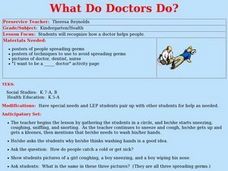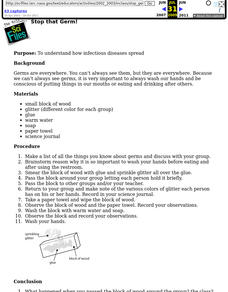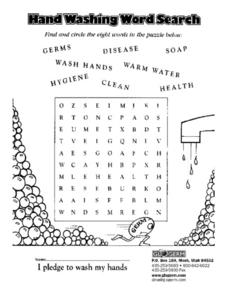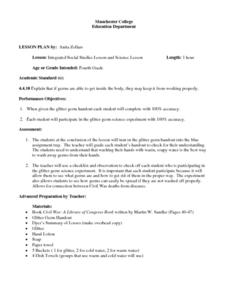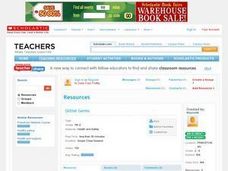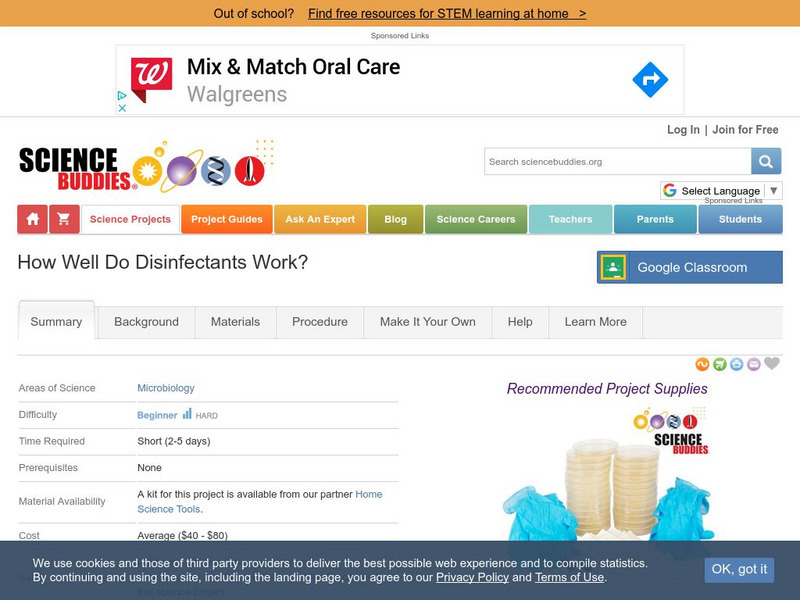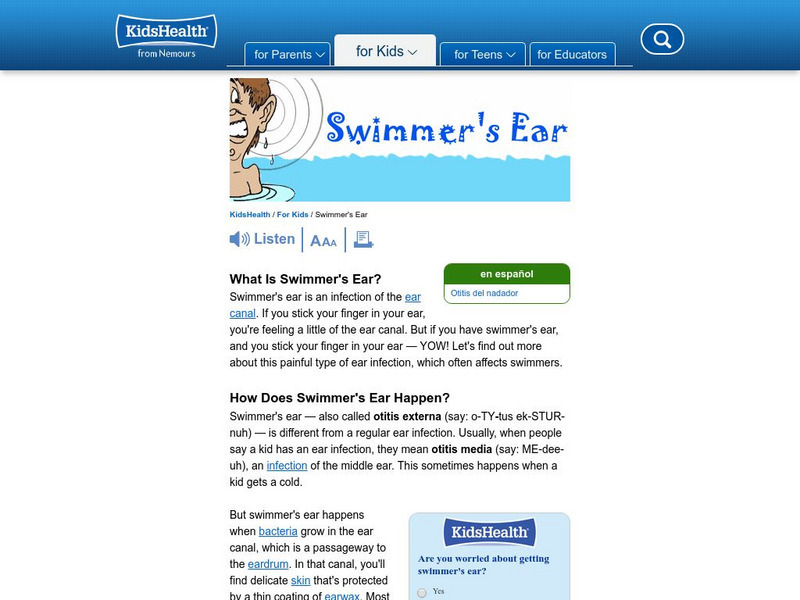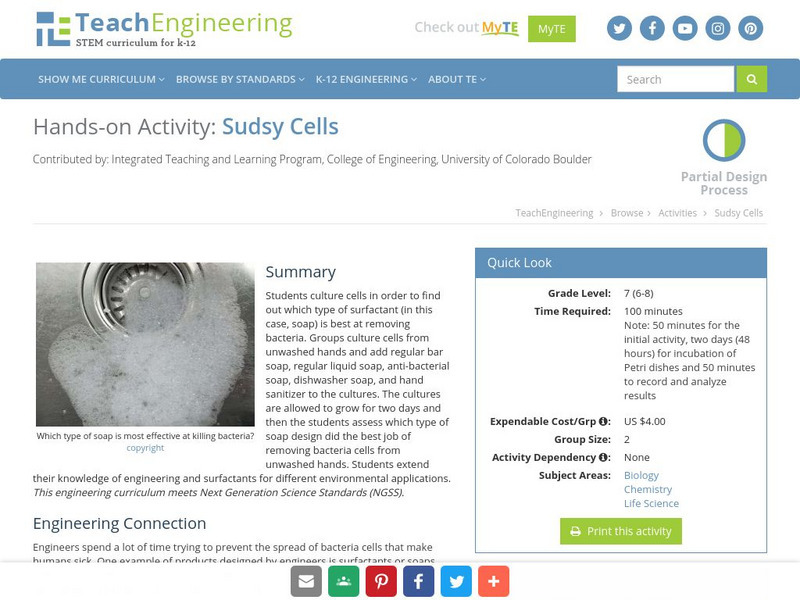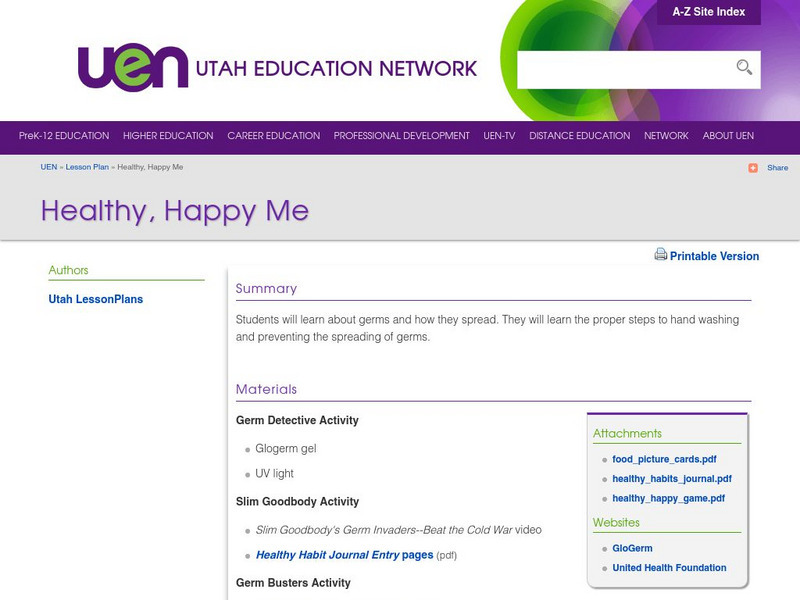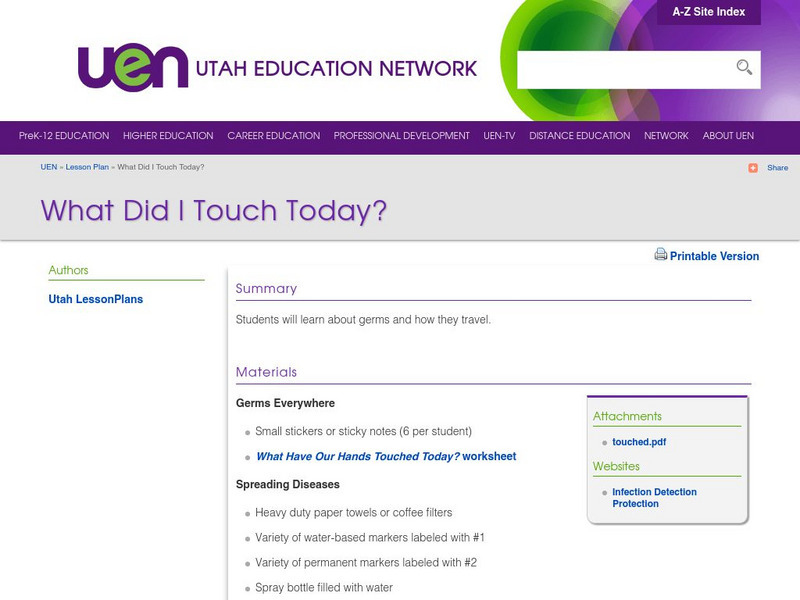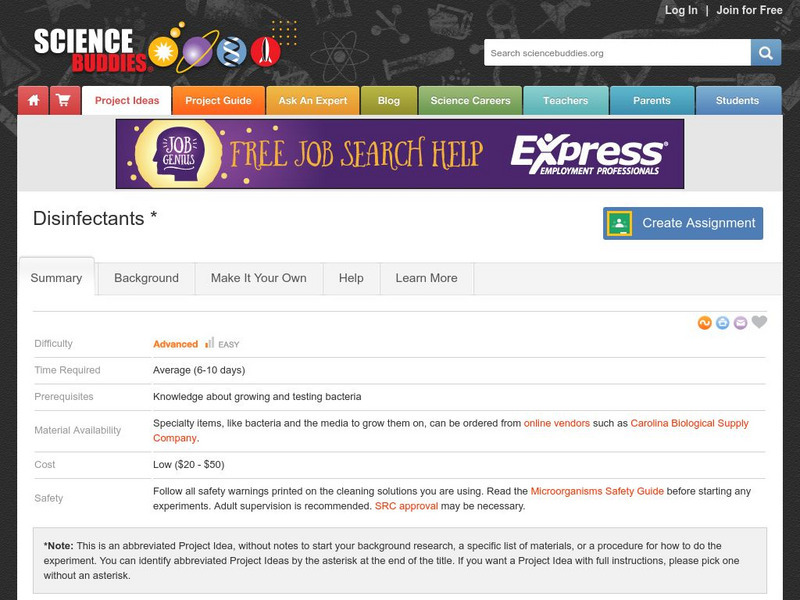Curated OER
What Do Doctors Do?
Students recognize how doctors help people and about germ spreading.
Curated OER
Washing Hands
Students read stories, conduct experiments and create graphs as they consider the importance of proper hygiene in maintaining their health. They identify the best way to wash hands and design handwashing posters for classroom placement.
Curated OER
Physical Health
Students identify how germs are spread, the diseases they can cause, and how hand washing can help prevent the spread of germs.
Curated OER
Germs and the Body
Students illustrate where germs exist, how they can get into and affect the body, and how the body defends itself against them.
Curated OER
Stop that Germ!
Students experiment with glitter to explain the importance of washing hands and how germs are distributed. After a lecture/demo, students perfom a simple experiment which clearly demonstrates how germs are spread.
Curated OER
Spreading Germs
Students observe and explore how and how quickly germs spread from person to person.
Curated OER
Preventing Germs
In this germ prevention worksheet, students color each picture. Students draw a blue circle around the pictures that show germs being prevented. Students make a red X through the ones that show germs being spread.
Curated OER
Hand Washing Word Search
In this word search learning exercise, students find words related to good hygiene. Eight words are included in this learning exercise. This learning exercise enforces the importance of washing hands to prevent spread of germs.
Curated OER
Disease Prevention
Fifth graders examine the various causes of the common cold. Using the internet, they identify the proper way to take care and treat a cold. They also describe the procedure to complete a throat culture. To end the lesson plan, they...
Curated OER
Germs
Third graders dicsuss germ. They discuss how they can't see them (germs), but they're everywhere! Students are asked if germs cause disease? They discuss some types of illnesses they get from germs. Students discuss ways inwhich...
Curated OER
Integrated Social Studies Lesson and Science Lesson
Fourth graders discuss the Civil War and the fact that many soldiers died during the war as a result of sickness. They discuss germs and participate in an activity that shows them how germs are spread and how they can be stopped from...
Curated OER
Germs
First graders discuss as a class how many of them have sneezed today. They then listen as the teacher explains that germs come out of their nose during a sneeze or when they blow their nose. They then discuss other ways that a person...
Curated OER
Glitter Germs
Students participate in a fun experiment involving glitter that teaches young children the importance of why they should wash their hands with soap and warm water. They explore that germs can easily spread if they don't properly wash...
Curated OER
Germbusters
Students identify various germs and discuss how germs are spread. They examine and identify materials in the daily environment, germbusters, which are useful in fighting germs, then play a fun germbuster game to help them remember how to...
Science Buddies
Science Buddies: Germ Invasion
Microbes are everywhere in our environment, but for the most part they escape our notice. This project shows you how to safely culture and study common bacteria from your everyday surroundings.
Science Buddies
Science Buddies: How Well Do Disinfectants Work?
Germs are everywhere. We try and clean our home with disinfectants, but do we really get rid of all the germs? Find out with this "hands-on" experiment.
Science Buddies
Science Buddies: Spread the Soap, Not the Germs
Washing your hands is the best way to prevent the spread of germs. But germs can be tricky; they find nooks and crannies to hide in, so it takes good hand-washing technique to get rid of them. This science project investigates which...
Other
Virginia Department of Agriculture & Consumer Services: Food Safety
A comprehensive food safety site including information on food poisoning, food safety tips, a food safety quiz and a site for educating children on food safety.
Curated OER
Kids Health: Swimmer's Ear
Swimmer's Ear is an infection in the outer ear canal. Read about how this infection comes about, how to treat it, and what to expect when you have Swimmer's Ear.
TeachEngineering
Teach Engineering: Sudsy Cells
Students culture cells in order to find out which type of surfactant (in this case, soap) is best at removing bacteria. Groups culture cells from unwashed hands and add regular bar soap, regular liquid soap, anti-bacterial soap,...
Utah Education Network
Uen: Healthy, Happy Me
In this health lesson plan, students will learn about germs and how they are spread. The importance of handwashing is emphasized in this lesson.
Utah Education Network
Uen: What Did I Touch Today?
In this lesson, students will assess what items in the classroom are touched the most. Students will investigate germs and distinguish between communicable and noncommunicable diseases.
Unite for Literacy
Unite for Literacy: Healthy Me: Wash Your Hands
Learn about the importance of hand washing and how to do it properly. Book includes audio narration in 18 additional languages with text in English.
Science Buddies
Science Buddies: Disinfectants
This experiment asks you to compare different types of cleaning agents. Household cleaning products, like bleach or Lysol, are included to see which ones kill the most bacteria. Different brands of antibacterial hand soap or dish soap...


